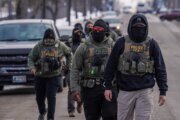WASHINGTON – They were the often unseen and unheard leaders of the March on Washington and the civil rights movement: women.
“It’s not that there were no women working in the movement, and that there were no women working on the march, there were a lot,” says PBS News Hour co-anchor Gwen Ifill.
Her comments came during a broadcast of The Kalb Report Tuesday night at the National Press Club.
Activist Daisy Bates and entertainer Josephine Baker both spoke at the March on Washington in 1963, but Ifill lamented that more women should’ve been given speaking roles at the march.
Congressman John Lewis, who was the National Chairman of the Student Nonviolent Coordinating Committee (SNCC) at the time of the march, says women weren’t given bigger roles in the movement because ministers were dominate figures in the early stages, and it was believed that a woman’s place was not on the front lines.
Ifill calls that a travesty.
“Women’s places in 1963, as Eleanor Holmes Norton told me, who was an organizer in the march, and this was pre-feminism, they were not seen to be part of the public eye,” she says.
Civil Rights activist Julian Bond, a founding member of SNCC, says while women may not have played a major public role in the march, their work behind the scenes paved the way for gender equality.
“[A. Phillip] Randolph had asked all the march participants to leave town that night. Dorothy Height said, ‘No, I’m not leaving,’ and she convened a meeting of women the next day, and some of the seeds of the feminist movement were sown right there,” says Bond.
Andrew Young, who was a member of Martin Luther King’s Southern Christian Leadership Conference (SCLC), says women were the driving force behind the movement’s most well-known leaders.
“If Martin Luther King and I and Ralph Abernathy hadn’t married little country girls from Perry County, Alabama, you probably would never have heard our names,” he says.
Follow @WTOP on Twitter.







